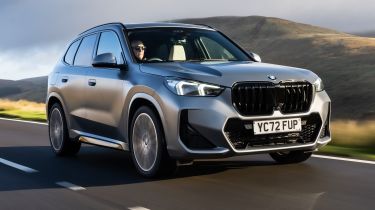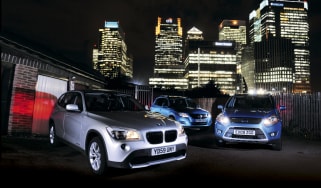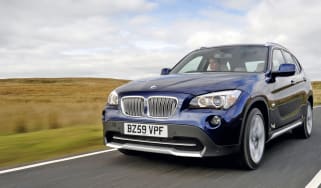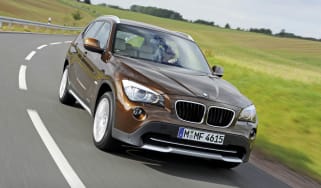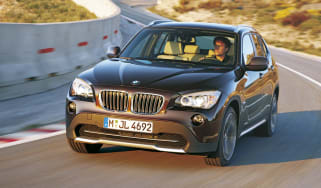BMW X1 review
The BMW X1 is a small premium SUV that offers plenty of interior space, excellent on-board technology and strong, efficient engines

The third generation BMW X1 is the best yet. The family crossover is more spacious inside with improved infotainment, while hybrid technology helps the petrol and diesel engine line-up to deliver even greater efficiency. More expensive plug-in hybrid models are also available, which widens the appeal of the X1 even further, particularly for business users.
Downsides? Well, the ride can be a little firm, particularly with the M Sport suspension set-up, and there are rivals that are cheaper to buy. The flaws are minimal, though, and we’re so impressed by the latest X1 that we’ve named it our 2023 Small Premium SUV of the Year at the Auto Express New Car Awards. As a capable family car that’s still good to drive, the BMW X1 is definitely worth considering.
About the BMW X1
If truth be told, the first-generation BMW X1 didn’t quite deliver the goods. It was rather drab to look at, while its lacklustre interior and dreary diesel engines certainly weren’t of the calibre buyers had come to expect – certainly from a brand that took pride in making ‘The Ultimate Driving Machine’.
Moving on from its debut in 2009, the X1 received the usual mid-life facelift treatment, followed by an all-new model in 2016 which felt more premium and was better to drive. A raised ride height meant the small SUV had a feel of its larger X3 sibling, too, and put to bed previous accusations of it being just a ‘jacked-up estate car’.
Used - available now
The latest third-generation BMW X1 has matured into a capable family car that offers more interior space than before, improved on-board technology and an appealing blend of performance and economy. It’ll need all of these attributes to win over customers in an increasingly competitive market.
BMW X1 prices and latest deals
How much does the BMW X1 cost? Well, official ‘on the road’ prices range from £36,690 to £54,465 but you can currently save an average of £6,493 through the Auto Express Find A Car service, where prices start at £33,194. You can lease a BMW X1 from £420 per month or buy a used model at prices starting from £27,000.
Check out our latest new car deals, leasing deals and used car deals for the top offers available now on Auto Express. And don't forget we can help you sell your car, too.
Engines, performance and drive
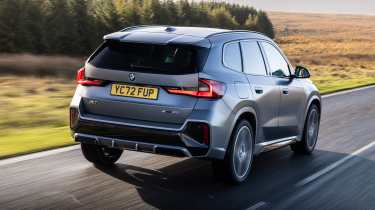
BMW has achieved a sweet spot with the X1 whereby, if you’re a keen driver with a growing family, you won’t feel too short changed if you choose the third-generation crossover model as your daily wheels.
Yes, you sit higher up than in the 1 Series hatchback, but the X1 offers lots of grip through tighter turns, while body roll is kept to a minimum. We’d like a little more feedback from the steering wheel, but it offers good precision along narrower, twisty B-roads.
Performance is strong whether you opt for petrol, diesel or hybrid power, although the top-of-the-range xDrive30e plug-in hybrid is seriously rapid for a family car. The seven-speed automatic transmission is less impressive; we found it to be slow-witted when attempting to pull away at junctions or roundabouts, which means navigating through busier in-town traffic is more problematic than it should be. Out on more open roads it’s perfectly fine, however.
Overall refinement is superb, although if you’re prioritising ride quality we’d recommend avoiding the larger 20-inch alloy wheels and firmer suspension set-up that comes with the M Sport trim level.
0-62mph acceleration and top speed
If you’re after the fastest standard X1 model then either of the two available plug-in hybrids will be your best bet. The 241bhp xDrive25e manages 0-62mph in 6.8 seconds, while the 321bhp xDrive30e is able to cover the same benchmark in an impressive 5.6 seconds.
The entry petrol (sDrive20i) and diesel (sDrive18d) models need 8.3 seconds and 8.9 seconds respectively, to do the 0-62mph sprint. The 215bhp xDrive23i petrol and xDrive23d diesel versions sit in the middle of the pack in terms of sprinting ability with respective 0-62mph times of 7.1 and 7.4 seconds.
If you have a real desire for outright speed, BMW has introduced a high-performance M model to the X1 range. The X1 M35i is powered by the same turbocharged four-cylinder 2.0-litre petrol engine that’s found in the M135i hot hatchback. With 296bhp and 400Nm of torque, this performance SUV sprints from 0-62mph in just 5.4 seconds. It even goes on to a top speed of 155mph.
MPG, CO2 and running costs
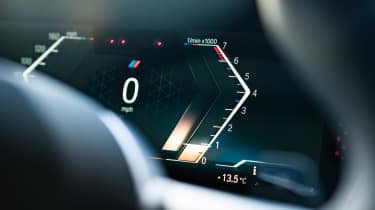
You’ll pay more to buy an X1 plug-in hybrid model than a regular petrol or diesel version, although this cost is offset by potential improvements in overall economy and lower emissions – provided you regularly charge the battery. BMW claims that the combined economy figure for either PHEV model is in excess of 300mpg, but company car drivers will be more interested in the 15-20g/km of CO2 produced at the tailpipe and the ability to travel up to 55 miles on battery power alone – all of which means a reduced Benefit-in-Kind tax rate.
Diesel-powered cars are more difficult to rationalise in an age of rapid electrification, but the X1 diesels offer impressive figures in isolation. All versions deliver 53 to 57mpg on the WLTP combined cycle, with CO2 emissions from 129-140g/km. Don’t be put off by the higher-powered xDrive23d model – it’s actually more efficient than the sDrive18d thanks to the use of mild-hybrid technology.
Private buyers will probably want to consider one of the pure-petrol options because they offer the cheapest route into X1 ownership and still manage up to 47mpg.
Insurance
Arranging insurance cover for the BMW X1 won’t be particularly cheap. Although entry 168bhp sDrive20i petrol models start in group 25 (out of 50), the more powerful petrol and diesel models sit in groups 30 to 31. Go for a more efficient PHEV version and insurance climbs to group 34 for the xDrive30e in M Sport trim.
In 2023, our example quote for an xDrive23i M Sport model, based on a 42-year old male living in Oxfordshire (with three penalty points), came to £701.
Depreciation
The third-generation X1 is bigger and better than before, so it’s perhaps no surprise that residual values are particularly healthy. After a typical ownership period of three years and 36,000-miles, the compact premium SUV is expected to retain 56-62 per cent, with the 168bhp sDrive2.0i petrol model performing the best in either xLine or M Sport trim.
To get an accurate valuation on a specific model check out our free car valuation tool...
Interior, design and technology
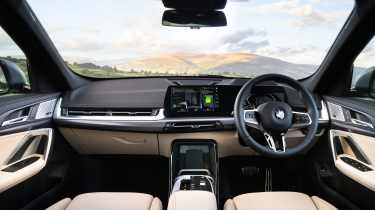
BMW has increased the size of the third-generation X1 so it now looks more commanding on the road, and there’s enough interior space for it to be considered a genuine everyday family car. Its 0.27 drag coefficient means it cuts through the air more smoothly, too, which adds to its sense of refinement.
The X1’s interior design holds more of a surprise, however. There’s an all-new fascia with a pair of curved screens taking centre stage, while the quality of the cabin materials has noticeably improved over the previous model.
The layout is ergonomically sound, although you will notice that there are fewer physical buttons and switches – the most significant change, and one we’re unsure is actually a step forward, is the removal of the rotary iDrive controller. Storage options up front are a little different than before; there’s a small tray located in the armrest with a larger space underneath, while we like the way smartphones are held in place with a useful hinged clip.
We have experienced a few technical niggles with our own BMW X1 xDrive32i long-term test car. After conducting a series of routine software updates via the iDrive infotainment system, the car’s fuel gauge and range readouts started displaying incorrectly and the interior light often switched itself on for no apparent reason. Apart from these relatively small faults, the technology has impressed overall.
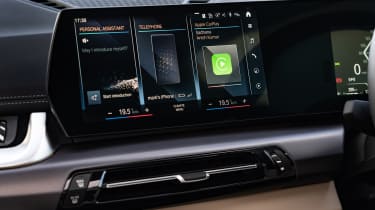
Sat-nav, stereo and infotainment
After years of granting users a range of input methods, BMW has finally ditched its iDrive click wheel controller. We think that’s a shame, because while touchscreens are much faster for entering commands when parked, the click wheel was perfect for minor tweaks to settings on the move, because you didn’t need to take your eyes off the road.
BMW reckons that its voice-recognition tech is now good enough to take its place. It’ll learn your accent and mannerisms over time, and although our two weeks with the car weren’t enough to let this develop, it seemed to be accurate, only once confusing a radio station request.
As with the system in the electric BMW i4, the climate controls have moved to the screen. While we’d prefer physical switches, these are one of the best of their type; the temperature settings are unobtrusive, and the full menu is easily accessible. One minor gripe is that some screen shortcuts are very small.
Practicality, comfort and boot space
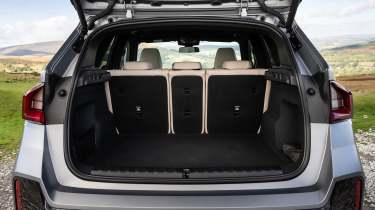
The BMW X1 is a spacious family car, offering lots of practical touches to help make journeys easier and more comfortable. Standard equipment for the entry-level Sport trim includes a power tailgate, dual-zone climate control, cruise control with a braking function and BMW’s Parking Assistant system which includes a reversing camera.
If you fancy dipping into the options list, you can specify the Comfort Pack (around £1,100) which includes a heated steering wheel, electrically-adjustable front seats with a memory function, along with lumbar support for the driver’s seat.
For around £2,900, the Technology Plus Pack adds a little extra practicality with equipment such as adaptive LED headlights, power-folding wing mirrors, BMW’s Comfort Access system (which provides keyless entry to the vehicle and allows you to open the tailgate with a sweeping movement of your foot under the rear bumper) and a head-up display.
Dimensions and size
BMW has increased the size of the X1; it’s now 4,500mm long which is an increase of 53mm, while it’s 24mm wider and 44mm taller, which is why it benefits from so much extra interior space. This doesn’t mean the X1 feels unwieldy on the road, though – it’s only just longer than an Audi Q3 and not much bigger than an average family hatchback.
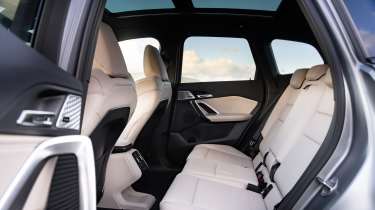
Leg room, head room & passenger space
An increase in overall size means that BMW has been able to free up extra room in the X1’s cabin – making it more spacious than a Mercedes GLA or Audi Q3.
Rear passengers benefit the most with good head and knee room, while the reclining seat backs make things even more comfortable. If you want the flexibility of being able to slide the rear seats back and forth, then you’ll need to stump up a further £300.
Boot Space
The X1 has a 540-litre boot, which is 45 litres more than you’ll find in a Mercedes GLA. All models feature a 40:20:40 split rear seat configuration and, if you fold all the seats forward, you’ll have a huge 1,545-litre cargo capacity. There’s also a handy under-floor area in the X1 where you can store soft bags or oddments.
Towing
If you want your petrol-powered X1 to carry out regular towing duties then you’ll probably want the 215bhp xDrive23i model, because it’s rated to tow up to 2,000kg. The 168bhp sDrive20i version has a 1,800kg maximum.
It’s the same pattern if you opt for a diesel variant, with the xDrive23d oil burner able to pull up to 2,000kg and the sDrive18d 200kg less. The plug-in hybrid models can tow 1,700kg (xDrive25e) and 1,800kg (xDrive30e).
BMW X1 alternatives
Reliability and safety
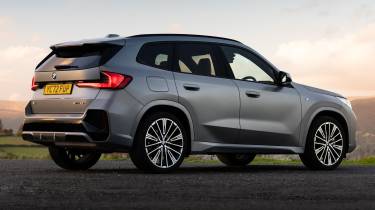
Industry safety body Euro NCAP awarded the X1 a top five-star rating in 2022. Impressive scores in the individual categories mean buyers should feel reassured when considering the X1 – particularly as their next family car.
Adult and child occupant safety was rated at 86 and 89 per cent respectively, while BMW’s commitment to increased technology in the X1 was reflected by its 92 per cent rating for safety assist systems. All models come with a forward-collision warning, lane-departure warning, speed-limit assist and a reversing camera, while options include lane-keep assist and adaptive cruise control.
The X1 didn’t make an appearance in our 2023 Driver Power customer satisfaction survey, although the BMW brand was well represented with the 1 Series, i3, 3 Series and 5 Series all in the 75-car list. BMW itself is still struggling to move up our best manufacturer rankings, with a 21st-place finish out of 32 brands.
Warranty
BMW offers a three-year, unlimited mileage warranty for the X1, which also includes a three-year subscription to the BMW Emergency breakdown service. This is better than the 60,000-mile limit provided by Audi. BMW’s paintwork warranty lasts for three years, while its anti-corrosion warranty covers 12 years.
Buyers can extend their BMW warranty after the three-year period with further plans offered at extra cost – either via monthly or annual payments.
Servicing
The BMW Service Inclusive plan allows buyers to make a one-off up-front payment which covers servicing costs for at least four years from the date of their car’s first registration. For X1 models this amount is around £911. Alternatively, you can opt for a monthly payment plan to help spread the cost of scheduled maintenance.
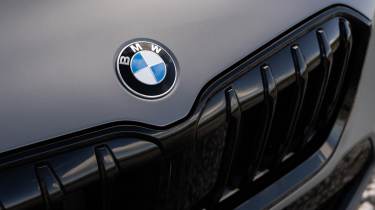
BMW X1 Alternatives
Rivals include the equally premium Audi Q2 and Q3, Mercedes GLA, Range Rover Evoque and the Volvo XC40, while the stylish Mazda CX-30 is an interesting alternative. The VW Group provides a closely-related trio in the shape of the Volkswagen T-Roc, SEAT Ateca and Skoda Karoq, while if you want a bit more style than these three offer, but still with plenty of practicality, then the Peugeot 3008 is also sure to impress.
The X1 range includes a strong line-up of petrol, diesel and plug-in hybrid engines, plus there’s the all-electric iX1 if you’re ready to make the change to battery-powered motoring. Front- (sDrive) and all-wheel drive (xDrive) models are available, with a seven-speed automatic transmission as standard, while the Sport, xLine and M Sport are the familiar trim levels that are on offer.
Deals on the BMW X1 and alternatives

